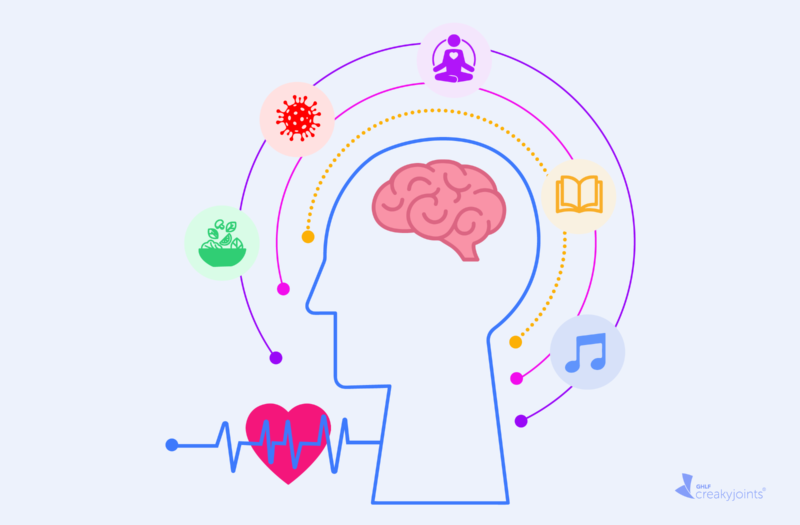Key Takeaways
- Mental and emotional health issues are common among people with rheumatoid arthritis.
- The vast majority of people who achieved and stayed in remission were considered to have good psychosocial health.
- It’s important for providers to consider patients’ mental and emotional health when discussing symptoms, treatment, and management of rheumatoid arthritis.
Living with a chronic illness like rheumatoid arthritis (RA) isn’t always easy, emotionally speaking. RA often overlaps with depression and anxiety, and some patients report feeling socially isolated. Now there’s evidence that emotional well-being correlates with the likelihood of staying in remission.
In a new study, published in the journal Arthritis Care & Research, a group of researchers from Belgium analyzed data from the CareRA trial, a multi-center clinical trial that was initially devised to study how different disease-modifying anti-rheumatic drug (DMARD) regimens impacted newly diagnosed patients. In this new study, researchers used the same group of 379 RA patients but focused in on the association between long-term (sustained) remission and social and emotional health.
Study participants were considered to have achieved sustained remission if their disease activity remained low from week 16 to week 104 of the study period. Disease activity was measured using DAS28-CRP. (Remission was defined as a score of less than 2.6.) This is an index that uses a combination of counting swollen and tender joints and measuring levels of the inflammatory marker C-reactive protein in the blood.
When Care-RA began, researchers asked the participants to complete three standardized self- assessments — the Short Form 36 (SF-36), the Revised Illness Perception Questionnaire (IPQ-r), and the Utrecht Coping List (UCL) — which included questions about mood, energy, perception of their condition, and the ability to socialize. They had them repeat the same three surveys at week 16.
The authors of the new study used these surveys, along with participants’ disease activity scores, to identify two groups of patients who had achieved sustain remission: a low psychosocial-burden group and a high psychosocial-burden group.
Eighty percent of those who had achieved sustained remission were in the low-burden group, meaning they did not report significant depression, anxiety, or other social/emotional problems by week 16, and remained in remission through week 104.
“Our results suggest that psychosocial wellbeing and illness perceptions, from as early as treatment initiation, are associated with the probability of achieving sustained remission in early RA,” the authors wrote. “These results are in line with previous studies that have shown an association between mental health in early RA and the response to treatment… [but] to our knowledge, our approach is unique because we additionally assessed illness perceptions and coping mechanisms.”
They added that these new results “suggest that psychosocial aspects and disease activity exert a complex, bidirectional influence on each other, with better psychosocial well-being predicting lower future disease activity and vice versa.”
Found This Study Interesting? Get Involved
If you are diagnosed with arthritis or another musculoskeletal condition, we encourage you to participate in future studies by joining CreakyJoints’ patient research registry, ArthritisPower. ArthritisPower is the first-ever patient-led, patient-centered research registry for joint, bone, and inflammatory skin conditions. Learn more and sign up here.
Doumen M, et al. Psychosocial Burden Predicts Sustained Remission in Early Rheumatoid Arthritis: Unraveling the Complex Interplay of Wellbeing and Disease Activity. Arthritis Care & Research. December 2021. doi: https://doi.org/10.1002/acr.24847.






